Eating well is key for your baby’s growth. Focus on foods rich in nutrients. This includes fruits, veggies, lean proteins, and whole grains. A balanced diet is the best start for a healthy pregnancy and baby.
Important nutrients include folate, calcium, vitamin D, protein, and iron. You need at least 600 micrograms of folate daily. This helps prevent birth defects. Also, aim for 1,000 milligrams of calcium and 600 IU of vitamin D for strong bones. Protein and iron are also crucial for your baby’s growth and your health.
Key Takeaways :Pregnancy Diet
- A balanced pregnancy diet focused on whole, nutrient-dense foods is essential for the health of both you and your baby.
- Key nutrients to prioritize include folate, calcium, vitamin D, protein, and iron, with specific daily recommendations for each.
- Prenatal vitamins can help fill any nutrient gaps in your diet during pregnancy.
- Consult your healthcare provider to determine your individual nutritional needs and supplement requirements.
- Maintaining a healthy pregnancy diet supports fetal development and sets the stage for a healthy delivery and postpartum period.
Essential Nutrients During Pregnancy
Pregnancy is a time when your body needs many nutrients. These help your baby grow and develop. Eating a balanced diet is key to getting the nutrients you both need.
Protein Requirements and Sources
Protein is crucial for your baby’s growth and organ development. You should aim for 71 grams of protein each day. Good sources include lean meats, poultry, seafood, eggs, beans, and dairy products.
Iron and Folic Acid Needs
Iron helps prevent anemia and supports red blood cell production. You need 27 milligrams of iron daily. Find it in lean red meat, fortified cereals, and leafy green vegetables. Folic acid, needed in 400-600 micrograms per day, prevents neural tube defects.
Calcium and Vitamin D Importance
Calcium and vitamin D are vital for your baby’s bone growth. Aim for 1,000 milligrams of calcium and 600 IU of vitamin D daily. Good sources include dairy products, fortified foods, and fatty fish.
| Nutrient | Daily Requirement | Key Sources |
|---|---|---|
| Protein | 71 grams | Lean meat, poultry, seafood, eggs, beans, dairy |
| Iron | 27 milligrams | Lean red meat, fortified cereals, leafy greens |
| Folic Acid | 400-600 micrograms | Prenatal vitamins, leafy greens, fortified foods |
| Calcium | 1,000 milligrams | Dairy products, fortified foods, leafy greens |
| Vitamin D | 600 IU | Fatty fish, fortified dairy, sunlight exposure |
Getting enough prenatal vitamins and nutrient-rich foods is important. It supports your health and your baby’s development during pregnancy.
Pregnancy Diet: Power Foods for Optimal Development
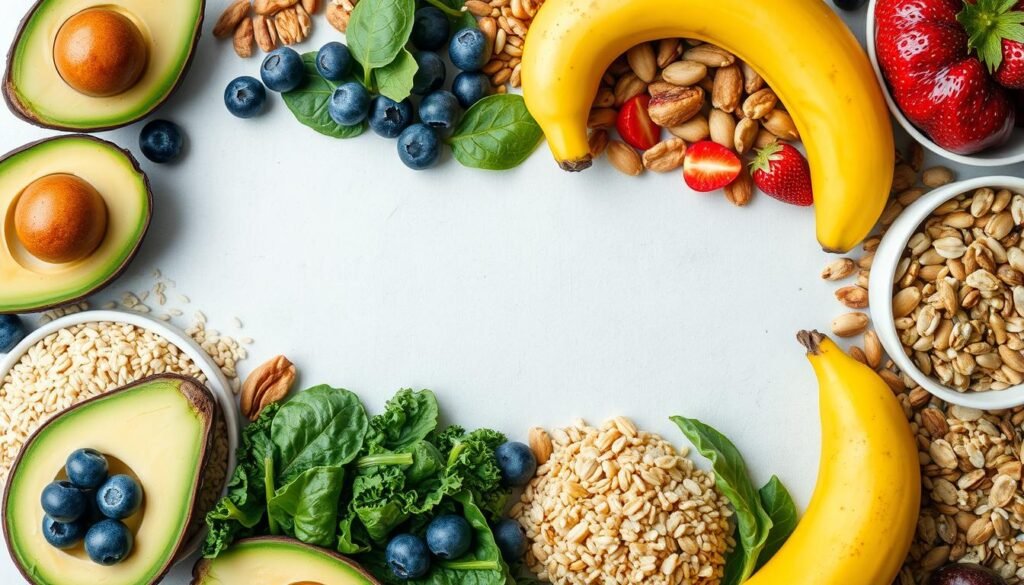
Eating a diet rich in nutrients is key for your baby’s growth. Superfoods can meet your higher nutritional needs and keep you healthy. These foods include dairy, leafy greens, and more, offering vitamins, minerals, and healthy fats.
Begin your day with oatmeal, a food that keeps you full and energized. Add cinnamon, blueberries, and Greek yogurt for a protein-rich breakfast. Eggs are also great, providing all the amino acids you need.
Choose lean meats like chicken or turkey for protein. Legumes, such as lentils and edamame, are rich in plant-based protein and fiber. Include whole grains like quinoa and brown rice for complex carbs and B vitamins.
Leafy greens like spinach and kale are packed with folate, iron, and calcium. Sweet potatoes offer beta-carotene, vitamin C, and fiber, supporting your body.
For healthy fats, eat avocados, nuts, and seeds. These foods are full of omega-3s, important for your baby’s brain and eyes.
Drinking enough water and low-sugar drinks is also important. By adding these superfoods to your pregnancy diet plan, you and your baby will stay healthy and strong.
“Proper nutrition during pregnancy is essential for the health and development of the baby. Incorporating a variety of nutrient-dense foods can help ensure both you and your child receive the nourishment you need.”
Safe Seafood Choices and Omega-3 Sources
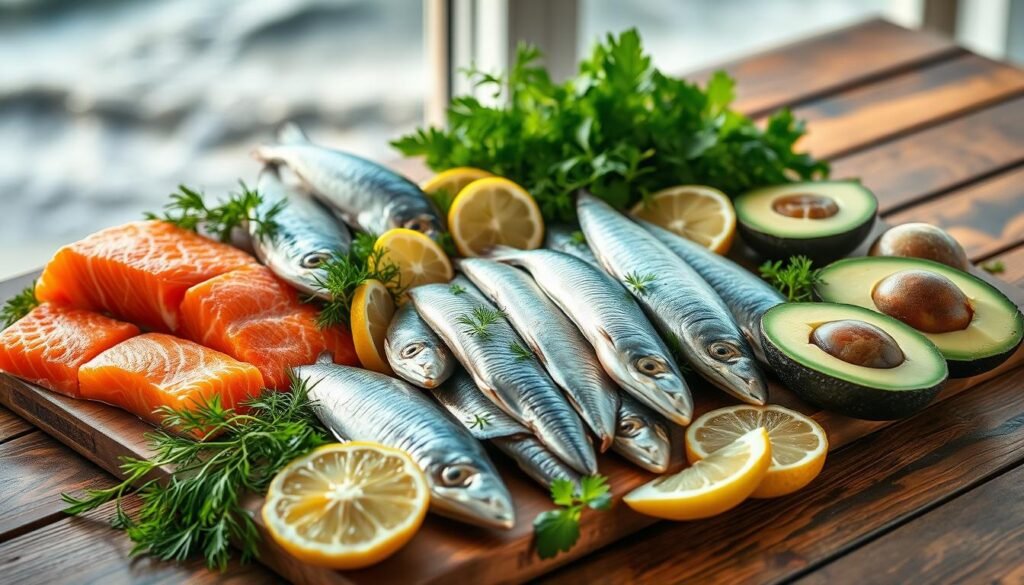
When you’re pregnant, picking the right seafood is key. Omega-3 fatty acids in some fish are great for your baby’s brain and eyes. But, some fish have mercury, which isn’t good during pregnancy.
Low-Mercury Fish Options
For safe and nutritious seafood, go for low-mercury fish like salmon, sardines, and canned light tuna. These are not only low in mercury but also packed with omega-3 fatty acids.
Weekly Seafood Recommendations
Pregnant and breastfeeding women should eat 8 to 12 ounces of seafood per week. Choose from the “Best Choices” list. This way, you and your baby get enough omega-3 fatty acids while avoiding mercury.
Plant-Based Omega-3 Alternatives
If you prefer plant-based omega-3s, flaxseeds, chia seeds, and walnuts are great. They offer a good source of these essential fatty acids without mercury worries.
Talking to your healthcare provider about seafood and omega-3 sources during pregnancy is smart. It helps you make choices that support your baby’s healthy growth.
“Consuming omega-3 fatty acids, like DHA from fish, during pregnancy aids in brain development, boosts IQ, increases brain size, and contributes to healthy eye development in infants.”
| Fish | Omega-3 Content | Mercury Level |
|---|---|---|
| Salmon | High | Low |
| Sardines | High | Low |
| Canned Light Tuna | Moderate | Low |
| Flaxseeds | High | N/A |
| Chia Seeds | High | N/A |
| Walnuts | High | N/A |
Foods to Avoid During Pregnancy
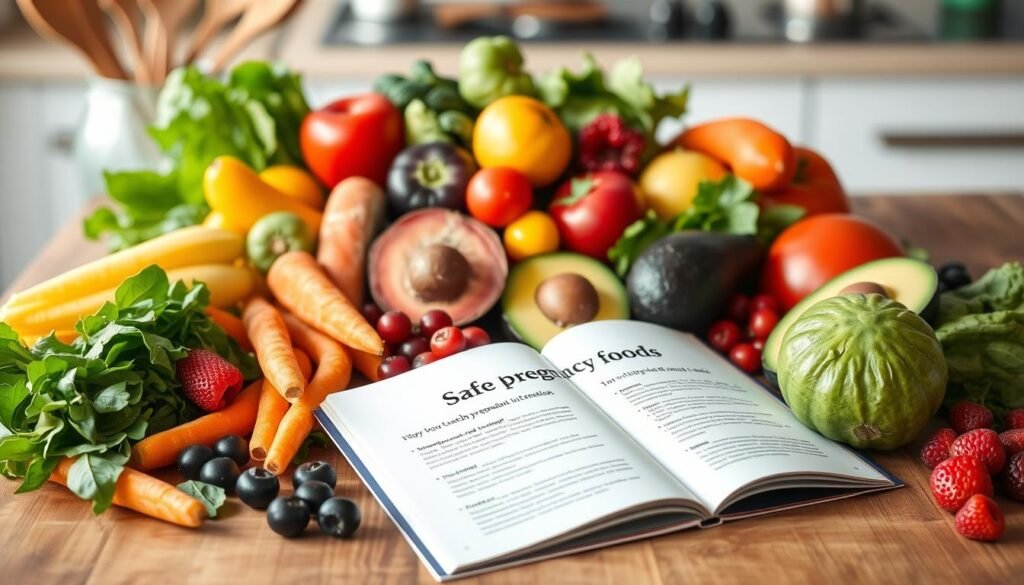
Keeping a balanced diet is key during pregnancy. It’s important for the health of both mom and baby. Some foods are better avoided to avoid health risks and foodborne illnesses.
Raw or undercooked seafood, like sushi and raw oysters, should be avoided. They can have harmful bacteria or viruses. The FDA warns against high-mercury seafood, such as tuna and shark.
Raw or undercooked meat, poultry, and eggs are also off-limits. They can have bacteria like Listeria and Salmonella. Be cautious with hot dogs and soft cheeses, as they can also cause Listeria.
- Unpasteurized dairy products and juices
- Raw sprouts, such as alfalfa, clover, radish, and mung bean sprouts
- Unwashed or unpeeled fruits and vegetables
- Highly processed foods that are low in nutrients and high in calories, sugar, and added fats
Limit caffeine to less than 200 milligrams a day, as advised by the ACOG. Alcohol should be avoided entirely to prevent pregnancy complications.
By sticking to safe, nutrient-rich foods, pregnant women can lower the risk of pregnancy food safety issues. This helps in food-borne illness prevention and supports healthy fetal development during dietary restrictions.
Healthy Meal Planning and Portion Control
Keeping a balanced diet is key during pregnancy for your health and your baby’s. Your calorie needs change as pregnancy progresses. So, it’s vital to adjust your portion sizes.
First Trimester Nutritional Needs
In the first trimester, you don’t need extra calories. Eat a variety of nutrient-rich foods to support your baby’s growth. Aim for 1,600 to 2,000 calories daily, based on your pre-pregnancy weight and activity.
Second and Third Trimester Adjustments
Your calorie needs will go up as your pregnancy advances. In the second and third trimesters, you’ll need an extra 200 to 300 calories daily. Increase your portion sizes and choose whole, high-quality foods to meet these needs.
Smart Snacking Options
Eating a meal or snack every 3 to 4 hours helps with nausea and keeps your energy up. Opt for snacks with 200 to 300 calories, like yogurt with fruit, whole-grain crackers with peanut butter, or carrot sticks with hummus. Make sure to include different food groups to get all the nutrients you need.
Also Read : Benefits Of A Low Sodium Diet: Improving Health And Wellbeing
FAQs
Q: What are some important aspects of healthy eating during pregnancy?
A: Healthy eating during pregnancy is crucial for both the mother and the baby’s growth and development. It’s important to focus on a balanced diet that includes a variety of foods, ensuring you get enough vitamins and minerals, healthy weight gain, and proper nutrition to support your baby’s needs.
Q: What foods should pregnant women eat to ensure they are getting enough vitamins and minerals?
A: Pregnant women should incorporate a variety of food sources rich in essential nutrients. Foods to eat include leafy vegetables, fruits like oranges and berries, whole grains, lean proteins such as chicken and salmon, and dairy products for calcium. These foods provide vital vitamins and minerals necessary for a healthy pregnancy.
Q: How does weight gain during pregnancy differ from weight gain before pregnancy?
A: Weight gain during pregnancy is expected and varies depending on the individual’s body type and the number of babies being carried. The American College of Obstetricians recommends a healthy weight gain range based on your weight before pregnancy, which is important for the health of both the mother and the baby.
Q: What are some pregnancy superfoods that can support healthy weight gain?
A: Pregnancy superfoods include salmon, avocados, sweet potatoes, and quinoa. These foods are nutrient-dense and provide essential fatty acids, fiber, vitamins, and minerals that support healthy weight gain and overall health during pregnancy.
Q: Is it necessary to take a supplement during pregnancy?
A: Yes, many women need to take a supplement during pregnancy to ensure they get the recommended daily intake of essential nutrients, such as folate and iron during pregnancy. These supplements help prevent anemia during pregnancy and support the baby’s growth and development.
Q: How can I manage constipation during pregnancy through diet?
A: To manage constipation during pregnancy, it’s important to eat foods high in fiber, such as fruits, vegetables, whole grains, and legumes. Drinking plenty of water and including a good source of probiotics, like yogurt, can also help keep your digestive system healthy.
Q: What should I consider if I want to follow a vegetarian diet during pregnancy?
A: If you choose to follow a vegetarian diet during pregnancy, it’s important to plan healthy meals that include a variety of food sources to ensure you get enough protein, iron, calcium, and vitamin B12. Incorporating legumes, nuts, seeds, dairy, and fortified foods can help meet these nutritional needs.
Q: How much should I eat during pregnancy to maintain a healthy weight?
A: The amount you need to eat during pregnancy varies based on your weight before pregnancy and your activity level. Generally, pregnant women should increase their caloric intake by about 300 calories per day during the second and third trimesters to support healthy weight gain and the baby’s growth.
Q: What role does iron during pregnancy play in the health of the mother and baby?
A: Iron is essential during pregnancy as it helps produce hemoglobin, which carries oxygen to the mother and baby. Sufficient iron intake prevents anemia during pregnancy, which can lead to complications. Good sources of iron include lean meats, beans, spinach, and fortified cereals.
Source Links
- https://odphp.health.gov/myhealthfinder/pregnancy/nutrition-and-physical-activity/eat-healthy-during-pregnancy-quick-tips
- https://www.mayoclinic.org/healthy-lifestyle/pregnancy-week-by-week/in-depth/pregnancy-nutrition/art-20045082
- https://www.healthline.com/nutrition/13-foods-to-eat-when-pregnant
- https://medlineplus.gov/pregnancyandnutrition.html
- https://www.marchofdimes.org/find-support/topics/pregnancy/vitamins-and-other-nutrients-during-pregnancy
- https://www.johnmuirhealth.com/health-education/health-wellness/pregnancy-breastfeeding/nutritional-needs-during-pregnancy.html
- https://www.parents.com/pregnancy/my-body/nutrition/15-pregnancy-power-foods1/
- https://www.medicinenet.com/pregnancy_superfoods/article.htm
- https://www.fda.gov/food/consumers/advice-about-eating-fish
- https://eatmidwestfish.org/nutrition-safety/fish-pregnancy/
- https://www.mayoclinic.org/healthy-lifestyle/pregnancy-week-by-week/in-depth/pregnancy-nutrition/art-20043844
- https://www.healthline.com/nutrition/11-foods-to-avoid-during-pregnancy
- http://healthengagement.kaiserpermanente.org/wp-content/uploads/healthy-pregnancy-plate.pdf
- https://www.marshfieldclinic.org/specialties/obgyn/pregnancy/diet/pregnancy-diet-myplate
- https://www.hopkinsmedicine.org/health/wellness-and-prevention/nutrition-during-pregnancy



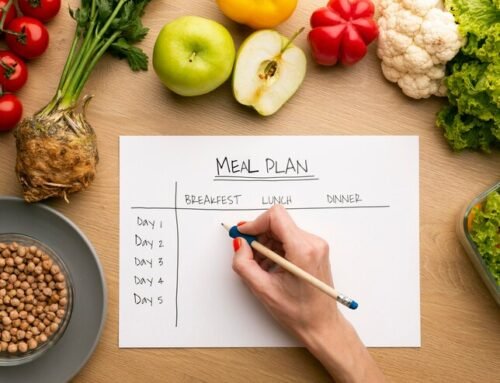



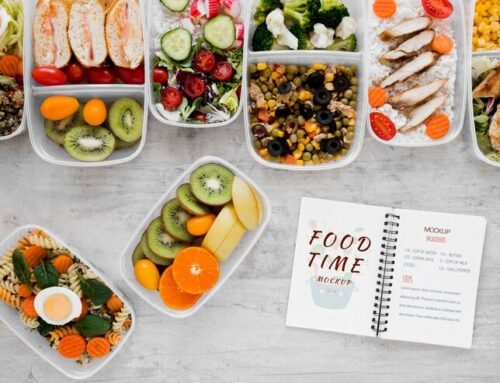
Leave A Comment